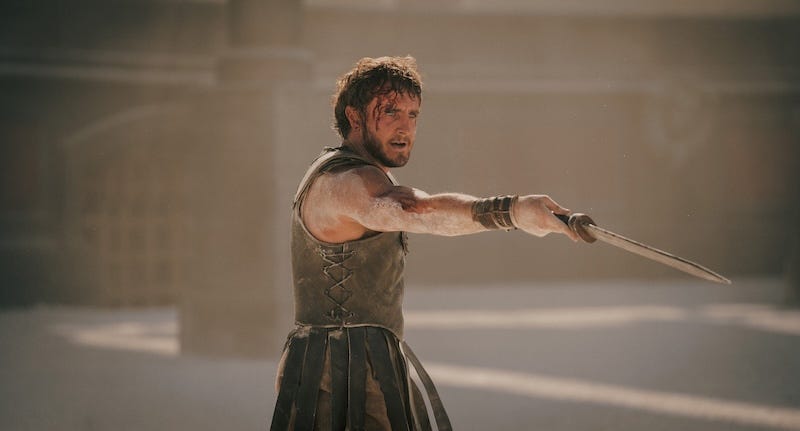What Made Gladiator Great—and Why the Sequel Fell Short
Gladiator II failed to capture the depth, nobility, and emotional weight of its predecessor—losing its hero’s purpose and the heart of its legacy in the process
Gladiator II failed to capture the depth and impact of its predecessor. What went wrong?
The first Gladiator movie is one of my favorites–if not in the top five, then certainly in my top ten. But the sequel was lacking in several areas, despite featuring talented actors and interesting characters. What did the second movie fail to deliver that the first one had?
I’ve seen some commentators blame the overwrought script and a weaker cast, despite the presence of Denzel Washington and Pedro Pascal. Connie Nielsen and Derek Jacobi reprised their roles from the original, though Jacobi was almost completely wasted here with virtually nothing to do. Pedro’s General Acacius was an admirably complex character–initially positioned as a villain by providing the protagonist’s motivation for revenge, only to be revealed as more heroic. In fact, if the film had focused on him as the main character, it might have turned out better.
Meanwhile, Denzel’s Macrinus started as a relatively neutral character–was he a good guy or a bad guy?–but his transformation into the villain was too slow and understated. Yes, we get some motivation for his actions, but not much. Was his endgame to destroy the empire or just the emperors? Was his improbable plan to rise up from a gladiator owner to power behind the throne meant to overthrow everything?
Then there was the film’s many moving parts: Acacius’s rebellion, the emperors' madness, Macrinus’s scheming, and Lucius’s quest for revenge. The gladiatorial combat itself felt like an afterthought, and the plot suffered as a result.
But then there’s the main character, Hanno/Lucius. What set his story apart from Maximus’s in the original? Why didn’t the sequel match the first film? Both protagonists had revenge-driven motivations following the death of a loved one. But whereas Maximus was noble and focused, Hanno came across as brutal and petulant. He was just angry–angry at his mother, at his captors, at the man who killed his wife, and at Rome itself. Maximus, meanwhile, remained loyal to Rome and its people; it was the usurper he sought to defeat.
In the end, it was Maximus’s noble sacrifice that elevated him, making him a martyr to a greater ideal while also allowing him to leave behind his brutal warrior life and enter an afterlife of peace and contentment with his wife and son. Maximus was a father and husband seeking justice. Lucius was a son and husband seeking revenge. That distinction made all the difference.
The nobility of sacrificing everything for the sake of justice–giving up the possibility of love with Lucilla, the son he never knew he had, and his own life–to bring down a tyrant, save Rome, and achieve retributive justice for his family’s murder, elevated the first film.
By contrast, the death of Arishat in battle, at Acacius’s command, was not unjust. She was a warrior combatant, and her death was foreseeable. While Lucius had every right to grieve, his vendetta against Acacius was itself unjust, making him less sympathetic to the viewer.
A final note on the emperors, Geta and Caracalla: I know historical accuracy isn’t always expected (for example, the Roman conquest of Numidia occurred centuries before the film’s setting). But while Geta and Caracalla were real brothers and co-emperors, they were nothing like the effete, diseased lunatics depicted here. In reality, they were brutes who hated each other, refusing to be alone together without guards. Their mother had to mediate their disputes. Caracalla eventually assassinated Geta and ruled alone. None of this was included in the film, but it might have made for a more compelling story. As presented, neither the characters nor the actors lived up to the standard set by Joaquin Phoenix’s Commodus, who was both menacing and deeply unsettling. Yet another misstep for the sequel.
All that said, I didn’t hate or even dislike the movie. It was enjoyable–but ultimately forgettable. It certainly didn’t rise to the level of its predecessor.



I would have preferred a bit more historical accuracy in the first film followed by the same in the second. The entire story of Marcus Aurelius and the succession is quite interesting and regarded by many as a significant point in the eventual fall of the empire. Any real pretense of an intellectual component along with an ethical presence left the government upon his death. Internal struggles deflected attention from the predations of barbarians at the borders and by the time of the final breath of the empire in 476, there was little worth preserving. Still, both films present an atmosphere of the times that serve a lesson for history.